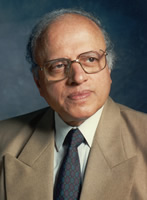|
| Biography |
| |
 Professor M.S. Swaminathan was Chairman of the UN Science Advisory Committee set up in 1980 to take follow-up action on the Vienna Plan of Action. He has also served as Independent Chairman of the FAO Council and President of the International Union for the Conservation of Nature and Natural Resources.
Professor M.S. Swaminathan was Chairman of the UN Science Advisory Committee set up in 1980 to take follow-up action on the Vienna Plan of Action. He has also served as Independent Chairman of the FAO Council and President of the International Union for the Conservation of Nature and Natural Resources.
Professor Swaminathan's contributions to the agricultural renaissance of India have led to his being widely referred to as the scientific leader of the green revolution movement. His advocacy of sustainable agriculture leading to an evergreen revolution makes him an acknowledged world leader in the field of sustainable food security. Professor Swaminathan was awarded the Ramon Magsaysay Award for Community Leadership in 1971, the Albert Einstein World Science Award in 1986, the first World Food Prize in 1987, Volvo Environment Prize in 1999, and the Franklin D. Roosevelt Four Freedoms Award in 2000.
Professor Swaminathan is a Fellow of many of the leading scientific academies of India and the world, including the Royal Society of London and the US National Academy of Sciences. He has received 43 honorary doctorate degrees from universities around the world. Recently, he has been elected as the President of Pugwash Conferences on Science and World Affairs. He currently holds the UNESCO Chair in Ecotechnology at the M.S. Swaminathan Research Foundation in Chennai (Madras), India.
|
| |
|
|
| |
| Abstract |
| |
|
Meeting the Challenge of Sea-level Rise |
|
|
|
It is now clear that there is every likelihood of sea level going up because of global warming induced melting of the Artic and Antartic ice caps as well as various glaciers. Countries like Maldives and other island nations are very worried about the damage that could be caused to lives and livelihoods as a result of seawater inundation. The tsunami of December 26, 2004 gave a wake up call in relation to the damage that can be caused to coastal agriculture and aquaculture through seawater ingress. In the short term, bio-shields consisting of mangroves, causarina, salicornia and other halophytic plants will have to be developed all along the coast. In the longer term, we should be prepared with crop and tree varieties tolerant to seawater. In this context, M S Swaminathan Research Foundation has been working during the last fourteen years on the transfer of genes from mangrove species to rice, mustard and other crops. The transgenic material has a high level of tolerance to seawater. A detailed strategy will be presented for empowering coastal communities to manage the consequences of sea level rise |
|
| |
|